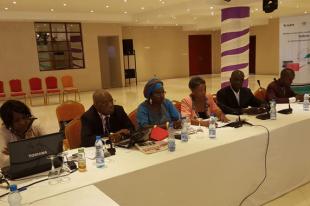
- Posted on:
- Related Parties: Gabon
Several activities have recently been implemented in Gabon that correspond to the recommendations of the needs assessment exercise that has been jointly implemented by the Convention Secretariat and the Government of Gabon.
Between 13 and 16 October 2015, two multisectoral workshops were organized in Libreville on taxation of tobacco products and on the ratification of the Protocol to Eliminate Illicit Trade in Tobacco Products, respectively. Around fifty national stakeholders, including members of the Parliament, high level officials from ministries such as trade, economy, budget, health, defense, youth and sports, communication, internal affairs, external affairs, as well as representatives of the civil society participated in the discussions. As a result of the discussions, two strategic documents detailing the next steps in these areas of work, were elaborated. (It is to be noted that Gabon is the first Party from the African continent that acceded the Protocol, on 1 October 2014.)
On the matter of taxation, participants agreed in the need to promote a revision of the Directive Nr 1/99/CEMAC-028-CM-03 of the Central African Economic and Monetary Community (that is made up of six States: Gabon, Cameroon, the Central African Republic, Chad, the Republic of the Congo and Equatorial Guinea) to harmonize their legislations concerning VAT and excises, with a view to increasing taxes on tobacco products.
In case of the Protocol, participants at the workshop discussed the need of elaborating regulations to implement the requirements of the Protocol, including, but not limited to the area of tracking and tracing of tobacco products.
WHO country and regional offices, as well as the civil society, participated in the meetings.
More recently, on 26-27 November 2015, national stakeholders came together to finalize Gabon's new Strategic Plan for Tobacco Control 2016-2020. The plan identifies tobacco control priorities for the years to come. They include : strengthening of the legal and institutional framework for tobacco control ; preventing the exposure to tobacco smoke of the population ; reducing the demand and supply of tobacco products ; developing and promoting means for tobacco cessation ; strengthening research and evaluation of the measures that have been taken ; and strengthening partnerships and collaboration in tobacco control. The Strategy reflects a responbility shared between the Government, partners and the civil society in implementing the actions therein.
For more information please see the attached documents.
